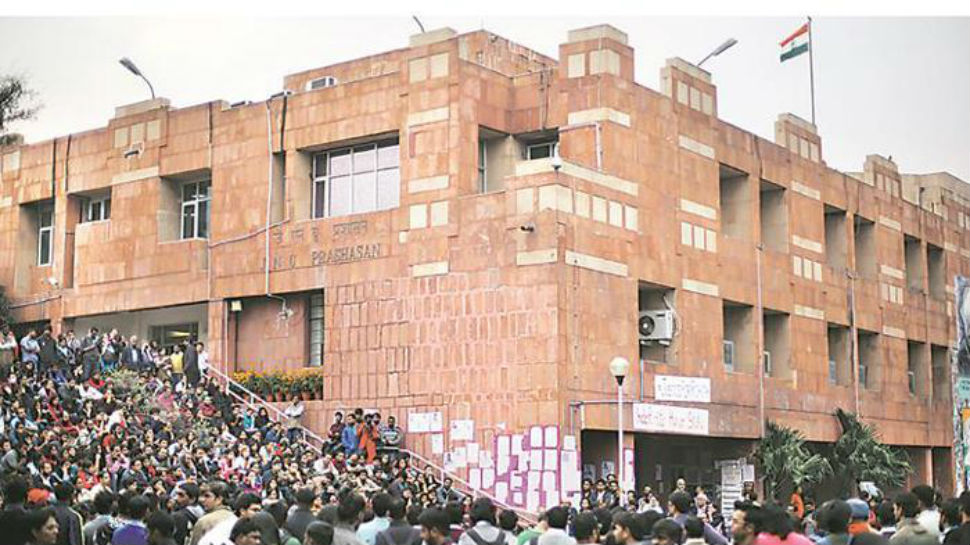
In fresh stand-off with V-C, JNU teachers have students by their side

Jawaharlal Nehru University (JNU) is in the news again and like most incidents on the campus, this too is about a standoff. However, this time it is between teachers and the vice-chancellor M Jagadesh Kumar.
In the latest tiff, the vice-chancellor has issued charge sheet to 48 teachers for a taking out a protest demanding his ouster last year over his alleged failures. This time however, the students union have joined hands with the teachers to take on the Andhra Pradesh-born karate expert and former professor of electrical engineering at IIT, Delhi.
Among the 48 are former and serving office-bearers of the university teachers’ association, several senior professors and a retired teacher.
In July last year, the teachers had organised a daylong strike over two issues. One, for the “harassment, targeting and humiliation of JNU teachers by the vice-chancellor and this administration in various statutory bodies” and two, for withholding the salaries of two teachers, one of whom has approached the Delhi Commission for Minorities, which has sent a notice to JNU.
While several students and some teachers have faced disciplinary action for a series of protests since Kumar assumed charge in 2016, this is the first large-scale action on the teachers and has the potential to trigger the dismissal of several senior professors. The teachers have until August 7 to respond.
In the notices sent to the teachers along with a video showing them protesting, Kumar has accused them of violating Rule M-7(6) of the Academic Rules and Regulations that ban protests within the 100-metre radius of the JNU campus. He has instituted an inquiry under Rule 14 of the Central Civil Services (Classification, Control and Appeal) Rules, 1965.
“What is happening in JNU is the deinstitutionalising of an institution. Stakeholders who have a role to play in the running of the university have been undermined. The faculty committee, academic council, executive council, bodies which run the institute, have been crushed. Debate and deliberations, which have been the character of JNU, has been done away with,” says Professor Atul Sood, president, Jawaharlal Nehru University Teachers Association (JNUTA).
In a statement, JNUTA, which stood by the accused teachers, said that “they were vindictively targeted by the JNU administration for raising their voices against the misdeeds and mismanagement of the University.”
Meanwhile, on Monday (July 29) the Jawaharlal Nehru University Students’ Union (JNUSU) expressed solidarity with the 48 JNU teachers. The students also demanded that the charges be dropped immediately.
Speaking to The Federal, Professor Sood said, “Democratic institutions in JNU, set up under the JNU Act passed by the Parliament, are being manipulated. This has led to a deep crisis, which is impacting the teaching-learning process. The V-C has issued a press release in November last year saying that Central Civil Service Rules doesn’t apply to JNU. However, in the charge sheet, he says we have violated CCS rules. The fight in JNU is not about ideology, but for implementing Constitutional norms envisaged for JNU.”
He also pointed out that the ordinance for the 100m rule was implemented in December 2018, “but our protest took place in July. What does this mean?”
Over the decades, JNU has been a model for a public university in India. With its low fee, subsidised accommodation and socially inclusive policies, JNU opened its doors to a large section of young people from marginalised backgrounds who could not have imagined pursuing higher studies.
However, in recent times, after Kumar took over as V-C, the number of research seats for MPhil and PhD was slashed by 84%, on the grounds that it was essential to balance the student-teacher ratio.
In the past two years, JNU has also witnessed a series of politically motivated appointments in the faculty. The admission policy is also being overhauled, with the V-C scrapping provisions such as unique deprivation points, under which students coming from backward regions of the country and women were given additional marks in their entrance exams.
“What is happening in the campus is a battle of mediocracy. The warring factions are just a bunch of opportunists, vying for power. They are ideologically bereft too. Most of them will change colours if there is another dispensation in the Centre. The saddest part is that academics is suffering due to this,” said an assistant professor from JNU on condition of anonymity.


